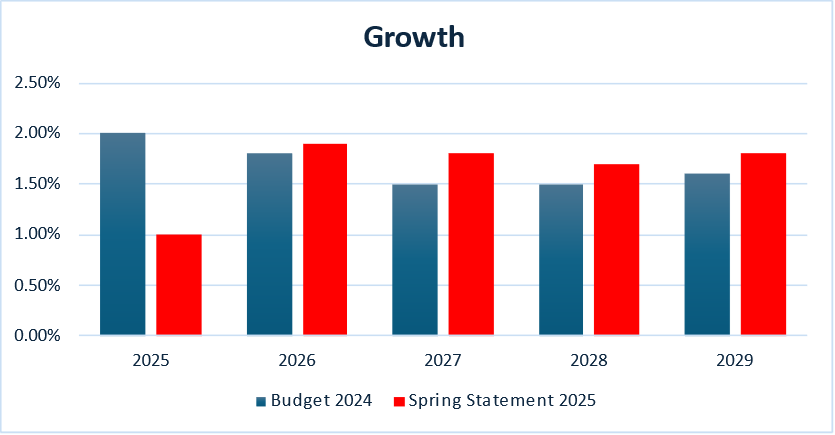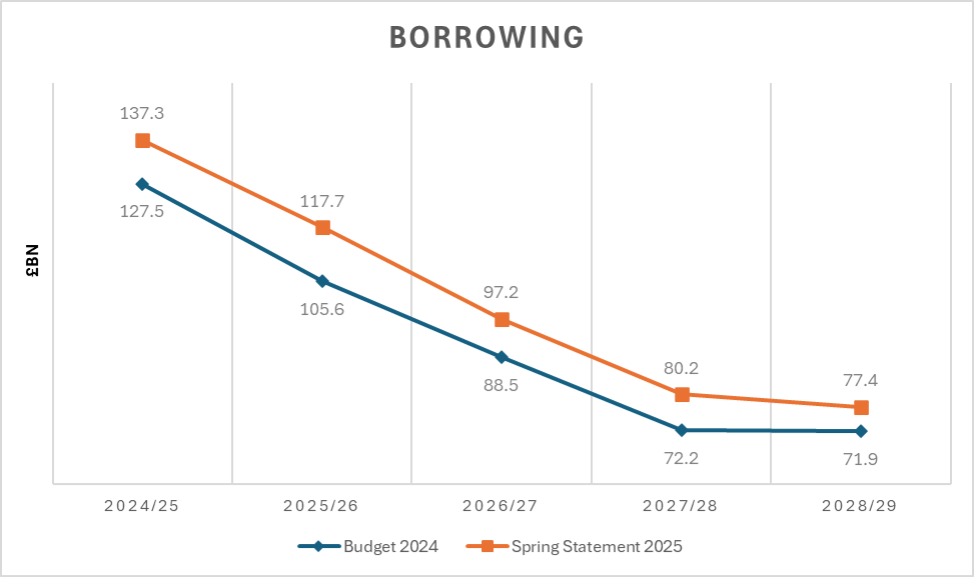As expected, the Chancellor did not talk for long. After all this was not a Budget, or even an Emergency Budget, as mischievously named by some opposition politicians. But it was an important statement nonetheless against a backdrop of a weakening economy, fragile business confidence, Donald Trump’s threat of tariffs and the ongoing war in Ukraine.
Rachel Reeves announced welfare changes amounting to net savings worth £3.4bn and cuts to day-to-day departmental spending of £3.6bn, as she sought to compensate for the disappearance of the borrowing headroom she thought she had at the time of the Autumn Budget 2024.
Aside from updates on growth, inflation and borrowing, there were various tax measures announced to help close the tax gap and increase the collection of old tax debt.
A consultation was also launched on Research and Development (‘R&D’) tax reliefs, with the aim of reducing error and fraud. During 2023/24, HM Revenue and Customs (‘HMRC’) opened 9,700 R&D enquiries and collected £441m in tax back. 77% of the R&D claims made required adjustment and HMRC R&D activity remains a hot topic.
Growth
Growth is the stated central mission of the Government, but Rachel Reeves stood at the Dispatch Box knowing that the Office for Budget Responsibility (‘OBR’) had halved its forecast to 1% for the year, which at least was more positive than the Bank of England’s downgrade to 0.75% in February.
The two revisions reflected the average forecast amongst economists in the comparison released by the Treasury earlier this month. In the Forecasts for the UK economy: a comparison of independent forecasts report, the economists surveyed estimated growth of 1% in 2025 and 1.3% in 2026.

Her response was to announce an investment of £13bn more in capital infrastructure, housing and defence over the next 5 years, a construction skills package to train up to 60,000 more skilled workers and an additional £2bn for social and affordable housing.
Further details will be published when the Government sets out its capital spending plans at the Spending Review in June. The plans are likely to include more information about the Oxford-Cambridge Growth Corridor and the proposed third runway at Heathrow.
Inflation
The Chancellor did receive some good news.
The gloomy growth news was lightened by a better than expected inflation number. The Office for National Statistics announced that inflation fell to 2.8% in February, down from 3% in January. An unusually high number of sales involving cheaper clothing and shoe prices were the main attributing factor.
Nevertheless, inflation is forecast to average 3.2% in 2025, compared with the OBR’s previous forecast of 2.6%. It will then average 2.1% in 2026, before returning to the Bank of England’s 2% target in 2027.
The Bank expects inflation to spike at 3.75% between July and September 2025 due to higher energy prices, water bills and bus fares.
In its March 2025 Monetary Policy Summary, the Bank commented that monetary policy will need to continue to remain restrictive for sufficiently long until the risks to inflation returning sustainably to the 2% target in the medium term have dissipated further.
Borrowing
Income tax (excluding Self Assessment) is forecast to raise £260.3bn in 2024/25, which will be a 10% increase on 2023/24. It is being driven by strong earnings growth allied to the frozen tax thresholds. The amount collected is expected to grow to £310.0bn by 2027/28, but will then slow when the tax thresholds are unfrozen in April 2028.
National Insurance Contributions (‘NICs’) are expected to raise £167.8bn in 2024/25, which will be a 6.3% reduction from 2023/24, following the reduction to employee NICs by the previous Government. However, when the employer NICs increases kick in next month, the amount of NICs collected is expected to rise to £200.6bn in 2025/26, an increase of nearly 20%.
VAT receipts are forecast to raise £171.3bn in 2024/25, an increase of 1.4% on 2023/24.
Corporation tax receipts are expected to come in at £92.7bn, an uplift of 5.5% from 2023/24.
Self Assessment related income tax is forecast to raise £49.7bn in 2024/25, an increase of 16.5% on 2023/24.
Despite all the extra direct and indirect tax being collected, the Government’s borrowing is going to escalate further, driven mainly by the interest it is paying on debt. Borrowing for this year is now expected to come in at £137.3bn, compared to the forecast of £127.5bn at the time of the Autumn Budget.

Tax
The Government has announced a further set of measures to reduce the tax gap and to improve debt collection within HMRC.
The measures include:
- Increasing the number of criminal prosecutions by 20%, from 500 to 600 per year, by 2029/30.
- Introducing a new reward scheme for informants, which will offer compensation linked to a percentage of any tax taken as a result of their actions.
- Tackling phoenixism, which will see HMRC, Companies House and the Insolvency Service working together to make directors personally liable for company taxes.
- Overhauling HMRC’s approach to offshore tax non-compliance by the wealthy, using external experts and AI to identify those who hide their wealth. HMRC is going to add another 400 members of staff to this initiative, which it is anticipated will deliver an extra £500m.
- £100m over the next 5 years to recruit an extra 500 HMRC compliance staff, on top of the 5,000 announced in the Autumn Budget last year.
- Investing £114m over the next five years to recruit an additional 600 HMRC debt management staff.
- An injection of £87m to develop HMRC’s existing partnerships with private sector debt collection agencies.
Tax debt has been at historically high levels since the pandemic. Over £44bn was owed at the end of December 2024, with around half that being debt over a year old.
From April 2025, late payment penalties for VAT taxpayers and income tax Self Assessment taxpayers will increase as they join the Making Tax Digital regime. The new rates will be 3% of the tax outstanding where tax is overdue by 15 days, plus 3% where tax is overdue by 30 days, plus 10% per annum where tax is overdue by 31 days or more.
If you require advice concerning HMRC’s relentless R&D activity, a tax investigation, or any other tax or VAT dispute with HMRC, then please get in contact by calling us on 0800 001 6686 or by email at info@independent-tax.co.uk for a no obligation consultation and for more information.
Independent Tax. Strong by your side and strong in your defence.
